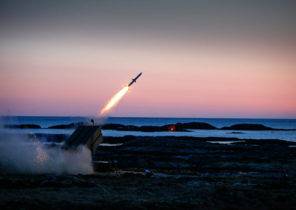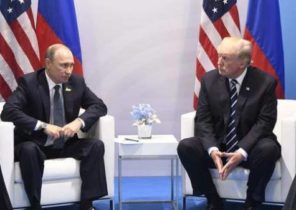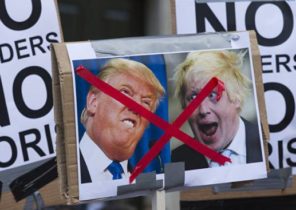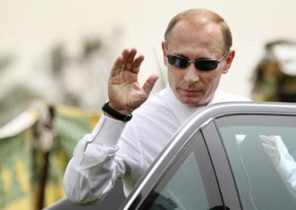Read the stories on the subject:
Chinese map of Putin
China is increasing its force in the Pacific
Trade war the U.S. and China: who wins?
New trump relationship with China
The first part
When XI Jinping, the China showcases the aspirations of a superpower. Just a few years ago, many American observers had hoped that China would be content with a supporting role in a liberal world order. Well, maybe he will challenge us influence in the Western Pacific ocean, but no more. According to popular belief, China was to seek to enhance its role in the region (and to the weakening role of the US), and refrain from far-reaching global ambitions. But now there are clear signs that China is preparing to challenge the world leadership of the United States, and these signs are present everywhere.
China has a shipbuilding program for the needs of the Navy, and he in the period from 2014 to 2018 was launched more ships than there are in the navies of Germany, India, Spain and Britain combined. Beijing seeks to dominate in the sectors of high technology, which in the future will depend on the ratio of economic and military power. China is conducting a campaign to establish its control over important waterways away from the Chinese coast, and the country has plans to establish bases and facilities logistics at great distances from its territory. In addition, the Chinese have systematically practiced the transformation of the economic impact of economic coercion in the entire Asia-Pacific region and beyond.
Equally important is the fact that if earlier China was hiding its ambitions, but now he shows them openly. “China has entered a new era — announced si in 2017, and it should take place in the center of the world stage”. Two years later, si used the idea of a “new Great trek”, describing it as a campaign proryvnogo call to China — the deterioration of relations between Beijing and Washington. Even strategic shock, the source of which was China, demonstrate its geopolitical aspirations. Let’s see how the government si trying to take advantage of because of his authoritarian secrecy coronavirus infection to extend Chinese influence and promotion of Chinese models abroad.
To recognize the accurate intentions and plans of the opaque authoritarian regimes is not easy. And uncompromising declarations of hostile intentions lies the danger, because they can lead to fatalism and become self-fulfilling prophecies. We have different opinions about whether more stable and constructive relations between the United States and China. But needs a certain degree of willful blindness to not wonder about whether it wants China to assert itself in the world as a leading power, and how he can achieve this goal. The architects of the American strategy toward China can face this problem head-on, no matter they instinctively seek to compromise, or they have confrontational plans.
If China wants to become a real superpower, there are two ways to achieve this. The first path strongly emphasize American strategists (to the extent that they recognize global ambitions of Beijing). This path goes through the native region of China, that is, through the Western part of the Pacific ocean. The main thing here is the formation of a regional superiority, which should be a springboard for turning China into a world power. This path is very similar to what at the time were the United States. The second way to expand its influence right around the world, including the West. In the second case are ignored historical laws of strategy and geopolitics. This approach to a lesser extent, aimed at the formation of inaccessible forces in the Western Pacific ocean and more on the benefits of the American system of alliances, and ensuring force presence due to the strengthening of China’s economic, diplomatic and political influence on a global scale.
Which of these paths China must give preference to? It is an urgent issue for Beijing strategists who have to make difficult decisions about what to do and what to avoid confrontations in the coming years. The question, in what way will China, has serious implications for American policymakers, and, ultimately, to the whole world.
Emerging conventional wisdom says that China is to consolidate its global influence will first try to establish regional hegemony. This does not mean that he will be a force to occupy neighboring countries (with the possible exception of Taiwan), as did the Soviet Union during the cold war. However, this means that Beijing should become the dominant power in the Western Pacific ocean to the first chain of Islands (which goes from Japan to Taiwan and then to Philippines) and beyond. It needs to, in essence, veto power over the decisions of their neighbors in military and economic matters. It needs to divide us alliances in the region, pushing American forces farther from Chinese shores. If China will not be able to do it, he will never have a solid regional base, therefrom to project power on a global scale. He will continually be faced with security problems along its unprotected Maritime periphery. And he will have to spend its energy and resources on military defense, not for offensive. And yet Washington maintains a strong military presence along the first ridge of Islands, a regional power, starting with Vietnam and ending with Taiwan and Japan, will counter the rise of China, rather than adapt to it. Simply put, China can not be a true world power, while he is surrounded by American allies and partners, bases and other outposts of the hostile superpower.
Why the script “from region — to the world” seems plausible to Americans? Because he is very much like their own path to world domination. From the first years of the Republic, American leaders knew that Washington is unlikely to play a significant role in world Affairs, if not go to a certain level of strategic invulnerability in North America and in the Western hemisphere as a whole. Such a strategic logic linked to many components of the long-running campaign to expel European rivals from the Western hemisphere, starting with the appearance in the 1820-ies of the Monroe doctrine and ending with the weakening of the power of Spain in the Caribbean sea during the war of 1898. The same idea was the basis of the US efforts in the 20th century: not to allow the Europeans to regain a foothold in the region. Some of these efforts have been highly questionable in moral terms, and some are deeply problematic in its practical consequences. This can be attributed to the addition of Theodore Roosevelt to the Monroe doctrine, announced in 1904, and undisguised war of the Reagan administration against Nicaragua in the 1980-ies became friendly with Cuba and the Soviet Union.
During the cold war, a bipartisan Commission made clear that the global power of America is inextricably linked to its dominance in the region. “The US ability to maintain an acceptable balance of forces in the world for reasonable money depends on internal security, on no land borders,” said the Commission. If America will have “to confront security threats near its borders, it will have to agree to a permanent increase in the burden of military spending… and as a result reduce their important commitments in other parts of the world.”
Of course, there are many indications that China is in some measure adopted this logic, as its policy is designed to establish regional domination. Beijing spends a lot of money on a modern air defense system, quiet submarines, anti-ship missiles and other means of restriction/blocking zones, which are necessary in order not to allow American ships and aircraft close to its shores and to have more freedom of action in relations with neighbours. Beijing have focused on how to transform the South China and East China sea into their lake. You can imagine that the reasons he’s about the same that was in the US when they were squeezed out rivals from the Caribbean.
China, like the US, uses a combination of incentives, coercion and political machinations in an attempt to weaken the Association of America with its military partners and allies. Chinese officials have put forward the idea of “Asia for Asians” (actually this is the slogan of Japanese militarists during the second world war, attributing it to China, the author seeks to bring together contemporary China with the Japanese ally of Hitler — approx. ed.). And they do not hide their conviction that the region should resolve their cases without the intervention of the United States. When si and his advisers proclaimed the concept of a “new model of relations between the leading States,” its basic premise was that the US and China can get along if each of the countries will stay on their side of the Pacific ocean.
Finally, the people’s liberation army of China has made no secret of the fact that it is increasing its expeditionary capabilities necessary to capture Taiwan. Such actions instantly turned on the head the balance of power in the region and cause deep doubts about the allegiance to the United States to its military commitments in the Western Pacific ocean. Some analysts believe that us-China war in the Taiwan Strait is quite possible now or in a few years. All these actions testify to the deep concern of China is that America is in the immediate vicinity. And of course, all of this fits into a more narrow concept of regional dominance of China. But it also seems that Beijing is trying to copy America’s way to world domination.
However, there are reasons to doubt that China will go this way if it is to aspire to the status of world superpower. In international Affairs blind imitation is always fraught with troubles and dangers, if we assume that the enemy always sees the world in exactly the same way as we do, or what he’s trying to copy our actions. This is especially true in this case, since Beijing now, it should be clear that to subjugate regional periphery it will be much harder than America.
The United States has ever fought in its hemisphere, with Japan and beyond the first island chains means for China, the invasion of Japan. Meanwhile, this is a serious regional power, in Alliance with the stronger power. USA also never had dealings with a number of such powerful opponents as India, Vietnam, Indonesia and many others. Meanwhile, these countries confront China along its land and Maritime periphery. USA never faced with a superpower that sees them as the greatest challenge for myself and not just annoying and weak opponent who must be appeased for the sake of support in the fight against greater threats. The attempt to achieve regional domination can lead to the fact that China in its strategic competition will focus on the struggle in which the United States is generally superior to the other. We are talking about high-tech military confrontation. Such a confrontation will simply encourage Chinese neighbors into the arms of Washington. While the efforts of Beijing to seduction and coercion bring partial success as he managed to some extent to change the geopolitical orientation of the Philippines and Thailand. But in relations with Australia and Japan, China’s efforts have given the opposite result. In short, it is still unclear whether Beijing is successfully pass this way and from a regional power to turn into a world. In this regard, the question arises: will China’s second path to global leadership?
To be continued…







